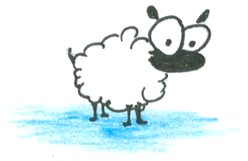HUMAN BEHAVIOUR:
a depiction in accordance with the principles of Science
I believe that pretty much all behaviour is a due to a person’s past and present circumstances. If we think of human behaviour as an equation, every single thought, feeling, environmental influence, past experience, and scrap of genetic code gets entered into that equation to determine how we’ll respond in any given situation. So the way that an individual responds in any given environment is pre-dictated (though NOT predictable - these influences are incredibly, infinitely complex). The way I act in a certain situation (a result of the way I think and feel in a certain situation), is always because of my cumulative learning, environment, and circumstance.
This does not mean that adults lack “choice” in their actions - because every adult in Canada is in control of their own circumstances to a certain degree. Thus, they can alter their own environment, learning, and circumstance in a way which is likely to alter their future behaviour - by manipulating just one part of the equation, we can end up changing the entire outcome. We seek out different experiences, and can learn skills and knowledge that we previously did not possess. We can change our environment drastically, and consequently change the environment within our own bodies, too; by changing the food in my fridge, the amount of stress I’m exposed to at work, the person I’m married to, etc., I can certainly change my health, blood pressure, and even neurological structure and chemistry. The results can lead to me feeling, thinking, and acting in a different manner when exposed to similar events. Most parts of our circumstances remain outside of our control and always will (we can‘t change our genetics, our past experiences, or the weather), but there is always at least some potential for future change and growth through adults influencing their own circumstances.
In many ways, those who fail to act in an appropriate manner are set up to fail (and vice versa; all very successful people had a lot of help in getting there). As communities, we all have some influence over each other’s environment and, consequently, future behaviours. A friend may lead you to start a new hobby or suggest you seek counselling, while a police officer may enforce legal consequences for certain behaviours. A person’s perfume choice may trigger a headache, while another person’s driving ability determines both your personal safety and speed in getting home. Every adult has a certain degree of influence over the environment of every other adult and child they encounter - as such, all members of communities are somewhat responsible whenever any member succeeds or fails. Times six billion people and fed into an infinitely complicated equation of human behaviour, this fact is slightly obscured - however, it is essential for individuals to remember that their every (positive or negative) action will inevitably influence countless people in a series of unpredictable ways.
According to this understanding of human behaviour, it’s hard to classify anyone as a Bad Person (or a ‘good’ person - people are just people acting according to their experiences and circumstances). However, there certainly are lots and lots of damaging people, or people who act in a manner which harms those around them, usually via some form of violence. We can accept that this is a result of circumstance which is largely outside of that person’s control (just as all behaviour is), however, it is the responsibility of all individuals to protect both themselves and others from those who are likely to cause damage. While the most obvious damage is the type we can see (‘physical’ violence, for example, often leaves obvious welts and bruises), all damage is in some ways physical (it alters a person’s brain chemistry and structure), and certainly all damaging experiences have some negative impact on an individual’s future (and can negatively influence the environment of many, many others).
Individuals who are habitually damaging to others do, like all individuals, have the potential to alter their own behaviour through influencing their circumstances and experience (and such individuals may also face externally mandated changes, such as legal intervention or forced counselling). Given the right opportunity and environment, almost everyone will act in way which is dramatically different from previous behaviours; however, the single best predictor of future behaviour remains how a person has behaved in the past. A husband who hits his wife when experiencing huge external stressors may stop after he finds a more relaxing job, for example, but he will likely continue to act violently if his stress levels rise to what they were before.
Everyone is prone to using the same behaviours over and over again, even when they are ineffectual or abhorrent, in part because so much of our behavioural influence is outside of our locus of control (we cannot change our genetics or our past). For individuals who cause damage to others, their behaviours are often facilitated by unusual attitudes and beliefs, or a lack of commonly held inhibitions. For example, if a parent believes that corporal punishment is acceptable in certain situations (and thus lacks inhibitions towards hitting their child), they are more likely to act violently towards their children in all situations. While beliefs and attitudes facilitate violent acts, these actions themselves increase the likelihood of future violence; our largest inhibitions are always against a new and unknown behaviours (‘once you cross that bridge…’), and personal values are often reoriented to allow us to repeat an act we’d previously deemed unthinkable. This pattern sets any individual up to fail, and then fail again, and again.
In interacting with a person who has a history of damaging or violent behaviour, it is important that we, too, do not set them up to fail, and that our interaction is done in a manner which makes damaging behaviour unlikely. A friend with a history of violence may only be seen in a public setting, for example, or a person with a history of sexual violence towards children could visit their own child, but never unsupervised. Opportunities and examples for better behaviour should be made available whenever possible, but never in a manner which compromises safety (especially towards children). This is not about judgment or punishment - it is solely about minimizing risk and acting to control one’s own environment. Individuals with a high degree of motivation can, and do, change their own behaviours - however, this process is at best a gradual shift and usually involves a great deal of relapse. In evaluating future safety, we must always ask what, if anything, in the environment has changed, and in turn question the motivation and consistency for that changing factor. An individual taking action to improve their own behaviour in no way obligates victims (or anyone else) to place themselves at risk.
Saturday, April 18, 2009
Subscribe to:
Post Comments (Atom)





No comments:
Post a Comment